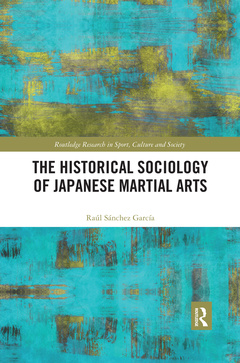The Historical Sociology of Japanese Martial Arts Routledge Research in Sport, Culture and Society Series
Auteur : Sanchez Garcia Raul

Winner of the Norbert Elias Book Prize 2020
This is the first long-term analysis of the development of Japanese martial arts, connecting ancient martial traditions with the martial arts practised today. The Historical Sociology of Japanese Martial Arts captures the complexity of the emergence and development of martial traditions within the broader Japanese Civilising Process.
The book traces the structured process in which warriors? practices became systematised and expanded to the Japanese population and the world. Using the theoretical framework of Norbert Elias?s process-sociology and drawing on rich empirical data, the book also compares the development of combat practices in Japan, England, France and Germany, making a new contribution to our understanding of the socio-cultural dynamics of state formation. Throughout this analysis light is shed onto a gender blind spot, taking into account the neglected role of women in martial arts.
The Historical Sociology of Japanese Martial Arts is important reading for students of Socio-Cultural Perspectives in Sport, Sociology of Physical Activity, Historical Development of Sport in Society, Asian Studies, Sociology and Philosophy of Sport, and Sports History and Culture. It is also a fascinating resource for scholars, researchers and practitioners interested in the historical and socio-cultural aspects of combat sport and martial arts.
1. Introduction, Part I: Warriors, 2. Archery and Sumo as First Traces of Martial Arts, 3. The Emergence of Composite Martial Ryu during the Two Courts and the Warring States Periods, 4. Excursus: the Origins of Martial ryu, Part II: Retainers, 5. The Stabilization of Martial Ryu During Early Tokugawa, 6. The Transformation and Diffusion of Martial Arts During Mid and Late Tokugawa Periods, Part III: Martial Artists, 7. The Identification of Martial Arts with the Japanese We-identity during Meiji, 8. Taisho Democracy as a Transition Phase in the Development of Martial Arts, 9. The Militarization of the Japanese Population Through Martial Arts in Early Showa, 10. Excursus: the Birth of Modern Martial Artists, 11. Reformulation, Expansion and Hybridisation of Japanese Martial Arts, 12. Epilogue
Raúl Sánchez García is Lecturer in sociology of sport at the School of Sports Science, Universidad Europea Madrid, Spain and President of the Sociology of Sport working group within the Spanish Federation of Sociology (FES). He has practiced diverse combat sports and martial arts and holds a shōdan in Aikikai aikidō.
Date de parution : 06-2020
15.6x23.4 cm
Date de parution : 08-2018
15.6x23.4 cm
Mots-clés :
Long Sword; Martial Arts; Raul Garcia; Sankin Kotai; Japanese Martial Arts; Norbert Elias; Muromachi Period; figurational sociology; Martial Traditions; Japanese history; Ueshiba Morihei; Japanese culture; Indigenous Japaneseness; mixed martial arts; Funakoshi Gichin; MMA; Double Bind Process; Musha Shugyo; Karate Masters; Boshin War; Tokugawa Shogunate; Civilising Pattern; samurai; Low Ranking Samurai; habitus; Warring States Period; bushi; Buke Shohatto; Kamakura bakufu; Late Tokugawa Period; Muromachi; Early Tokugawa Period; Sengoku; Early Tokugawa; ashigaru; Functional Democratisation; machi-yakko; Late Tokugawa; Shinto; Mainland Japan; Dai Nippon Buttokukai; Combat Sports; judo; Pro Wrestling; Jigoro Kano; Shrine Attendants; Morihei Ueshiba; aikido; Gichin Funakoshi; karate; Meiji; shotokan karate; Kyokushin karate; kendo; UFC; ultimate fighting championship; Raúl Shez García



